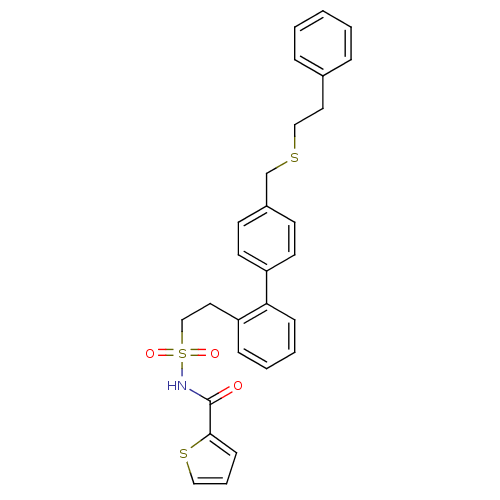BDBM50117685 2-(4'-Phenethylsulfanylmethyl-biphenyl-2-yl)-ethanesulfonic acid (thiophene-2-carbonyl)-amide::CHEMBL313700
SMILES O=C(NS(=O)(=O)CCc1ccccc1-c1ccc(CSCCc2ccccc2)cc1)c1cccs1
InChI Key InChIKey=YHFDLIAMXJUKHP-UHFFFAOYSA-N
Data 4 KI
Activity Spreadsheet -- Enzyme Inhibition Constant Data from BindingDB
 Found 4 hits for monomerid = 50117685
Found 4 hits for monomerid = 50117685
TargetProstaglandin E2 receptor EP3 subtype(Human)
Merck Frosst Centre For Therapeutic Research
Curated by ChEMBL
Merck Frosst Centre For Therapeutic Research
Curated by ChEMBL
Affinity DataKi: 480nMAssay Description:Binding affinity at human Prostanoid EP3 receptor.More data for this Ligand-Target Pair
TargetProstaglandin E2 receptor EP4 subtype(Human)
Merck Frosst Centre For Therapeutic Research
Curated by ChEMBL
Merck Frosst Centre For Therapeutic Research
Curated by ChEMBL
Affinity DataKi: 690nMAssay Description:Binding affinity at human Prostanoid EP4 receptor.More data for this Ligand-Target Pair
TargetProstaglandin E2 receptor EP2 subtype(Human)
Merck Frosst Centre For Therapeutic Research
Curated by ChEMBL
Merck Frosst Centre For Therapeutic Research
Curated by ChEMBL
Affinity DataKi: 2.50E+3nMAssay Description:Binding affinity at human Prostanoid EP2 receptor.More data for this Ligand-Target Pair
TargetProstaglandin E2 receptor EP1 subtype(Human)
Merck Frosst Centre For Therapeutic Research
Curated by ChEMBL
Merck Frosst Centre For Therapeutic Research
Curated by ChEMBL
Affinity DataKi: 2.80E+3nMAssay Description:Binding affinity at human Prostanoid EP1 receptor.More data for this Ligand-Target Pair
